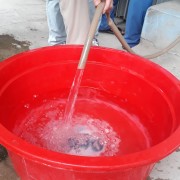Speeches Shim

For decades, residents of Nga Truong commune in Thanh Hoa province have relied on untreated well water or rainwater. In 2018, the provincial government approved an investment plan to build a water distribution network in the commune. However, project implementation was delayed and was at risk of cancellation due to several challenges, including lack of support and resources. To address this, USAID’s Vietnam Local Works for Environmental Health project, implemented by the Institute of Population, Health and Development, collaborated with Thanh Hoa authorities to engage local actors to advocate for and mobilize resources through a multi-stakeholder partnership and carried out a communication campaign to encourage community support for the project.
Although factory employees are screened annually with chest x-rays, these screenings do not align with the NTP’s preferred “Double-X” TB case finding strategy, which uses chest X-ray, and GeneXpert rapid TB screening and drug resistance testing. The USAID Sustainable HIV and Tuberculosis Response from Technical Assistance project and the NTP developed a standard procedure to detect TB cases in factories. They piloted the Double-X TB screening approach by offering it free of charge to employees of a local garment factory in Nghe An. From May 15-17, Nghe An Provincial Lung Hospital screened 1,026 factory workers that agreed to be tested (70.6 percent of staff; 840 female and 186 male), who were all confirmed TB-negative.
Vietnam is one of the largest destinations and transit points of illegal wildlife trade. In 2019, 203 cases of wildlife protection violations were recorded in the country, including Vietnamese Customs’ seizure of 3,000 kgs (6,613 lbs) of pangolin scales and nearly 10 tons of ivory in the first quarter itself. During wildlife crime investigations and trial processes, DNA forensics test results are critical pieces of evidence to identify poached or illegally traded wildlife products and their geographic origin, supporting the trial and prosecution of wildlife crimes.
A recent assessment by the Vietnam Assistance for the Handicapped organization shows that most of the district health centers and hospitals in Dong Nai province have limited capacity for rehabilitation services, and those offering services are limited to basic physical therapy with no capacity for occupational and speech therapies. Hence, persons with disabilities (PWDs) have to travel long distances to provincial hospitals to access these services. To improve this situation, in May 2020, USAID’s Disabilities Rights Enforcement, Coordination and Therapies (DIRECT) project provided equipment to four district hospital rehabilitation units and set up a therapy room for children with intellectual disabilities at a provincial center for Agent Orange victims in Dong Nai province.
Plastic consumption in Vietnam has risen steadily over the last two decades and Vietnam is among the top five source countries for the eight million tons of plastic dumped into the ocean each year. With each person generating an average of over 41 kilograms (90 pounds) of plastic waste each year, Vietnam stands as the third largest per capita producer of plastic waste in Southeast Asia, just behind Thailand and Malaysia. As a result of this rising pattern, Vietnam’s urban waste systems have struggled to keep pace--leading to the influx of plastic and other waste into inland rivers and lakes and into the sea along the country’s more than 3,300 kilometer coast.

Comment
Make a general inquiry or suggest an improvement.